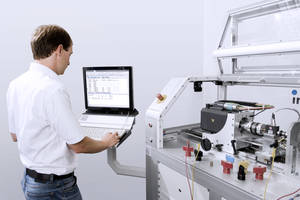imc CRONOSflex im Prüfstand
 Als modulares, flexibles Mess-, Steuer- und Regelsystem eignet sich imc CRONOSflex besonders für Prüfstandsanwendungen. Eine vielfältige Auswahl an unterschiedlichen Messmodulen, Feldbusschnittstellen und digitalen Eingängen, erlaubt es alle typischen Sensoren und Signale direkt anzuschließen und synchron zu erfassen.
Als modulares, flexibles Mess-, Steuer- und Regelsystem eignet sich imc CRONOSflex besonders für Prüfstandsanwendungen. Eine vielfältige Auswahl an unterschiedlichen Messmodulen, Feldbusschnittstellen und digitalen Eingängen, erlaubt es alle typischen Sensoren und Signale direkt anzuschließen und synchron zu erfassen.
Bei häufig wechselnden Prüfstandsaufbauten hilft die flexible Systemarchitektur, die eine bedarfsortientierte Zusammenstellung des Messsystems in Minutenschnelle ermöglicht. Die Möglichkeit Echtzeitberechnungen, Steuerungen und Regelungen direkt im System zu realisieren, unterstreicht die Vielseitigkeit dieser Geräteserie.
Auf einen Blick:
- Integrierte Signalprozessoren zur Echtzeitbrechnungen, Steuerung und Regelung
- Große Auswahl an Messmodulen und Schnittstellen für alle typischen Sensoren und Signale am Prüfstand
- Grafische Bedien- und Automatisierungssoftware zur Erstellung von Test-Sequenzen und Prüfstandssteuerungen
- PC-unabhängier Betrieb sorgt für sicheren Messbetrieb auch über Monate
- Messmodule und Basiseinheiten kommunizieren über EtherCAT und können darüber einfach in übergeordnete Automatisierungssysteme eingebunden werden
Prüfstandssteuerungen & -regelungen mit imc CRONOSflex
Gemeinsam mit der Messtechnik-Software imc STUDIO bildet imc CRONOSflex eine leistungsstarke Komplett-Lösung für Messdatenerfassung und Prüfstandssteuerung. Die flexible Hardware-Architektur mit integrierter Echzeitfunktionalität in Kombination mit der Software-Plattform imc STUDIO erlaubt es selbstständig komplexe Prüfstandssteuerungen und -regelung zu realisieren.
- Verknüpfen Sie Messschritte einfach per Drag & Drop zur einer vollständigen Testsequenz
- Erstellen Sie eigene Bedien- und Anzeigeseiten
- Erstellen Sie komplexe Echtzeitsteuerungen mit Sollwertvorgabe, Notabschaltung und Fehlerbehandlung
- Konfigurieren Sie verschiedenste Regler
- Integrieren Sie PC-basierte Auswerteroutinen über imc FAMOS
- binden Sie Datenbanken ein
- und vieles mehr
Integration von imc CRONOSflex in Automatisierungen
Zur Integration von imc CRONOSflex in übergeodnete Steuerungen und Automatisierungssysteme stehen Ihnen verschiedenste Hard- und Softwareschnittstellen zur Verfügung:
- CAN
- EtherCAT
- EtherNet
- CANopen
- *.dbc, *.a2l
- CoE (CANopen over EtherCAT)
- VIs für NI Labview
- Treiber für NI DIAdem
- imc COM
- .NET.
imc CRONOSflex im mobilen Einsatz
Bei mobilen Einsätzen ist eine robuste und kompakte Hardware gefragt. Mit imc CRONOSflex steht Ihnen ein System zur Verfügung, das nicht nur kompakt und robust ist, sondern auch vollständig autark ohne PC messen kann. In Kombination mit Selbststart und -stopp sowie integriertem Flashspeicher ist das System die perfekte Black-Box für unbemannte Messeinsätze.


Die präzise Erfassung unterschiedlicher Sensoren und Signale, der einfache und schnelle Signalanschluss, die synchrone Aufzeichnung von Fahrzeug-Bus-Daten wie CAN, LIN oder FlexRay und eine stabile Spannungsversorgung sind ebenfalls wichtige Eigenschaften, die imc CRONOSflex für den mobilen Einsatz auszeichnen.
Auf einem Blick:
- Autarker Messbetrieb erlaubt den Einsatz als Black-Box-Messsystem ohne PC
- Auto-Start, -Speicherung, -Stopp dank intelligentem Netzteil mit Kurzzeit-USV
- Batterie-Pack für komplett autarke Messungen ohne Versorgung
- Integrierte Signalkonditionierung für unterschiedlichste Sensoren und Signale
- Synchrones Erfassen von Fahrzeugbussen wie CAN, LIN, FlexRay, etc.
- Robuste Hardware: mit optionalem erweiterten Temperaturbereich von -40 bis +85°C sowie Schock- und Vibrationsschutz nach MIL-810F
Ergebnisberechnung während der laufenden Messung
Die integrierten Signalprozessoren von imc CRONOSflex erlauben während der Messung Echtzeitberechnungen durchzuführen, wie z.B.:
- Mathematische Funktionen wie Min, Max, Mittelwert
- Intelligente Datenreduktionsverfahren
- Fertige Analysefunktionen wie FFT, Ordnungsanalyse, Spektralanalysen
- Ein-, zwei-, drei-phasige Leistungsberechnungen
- DMS-Rosettenberechnung
- Online Klassierungen und statistische Bewertungen
- u.v.m.
So können bereits während der laufenden Messung Daten verdichtet und fertige Analyse-Ergebnisse produziert werden - das spart Speicherplatz, reduziert den Analyseaufwand oder ersetzt diesen sogar vollständig.
Remote Monitoring & Ferndatenübertragung
Die Möglichkeit, aus der Ferne auf ein im Feldversuch eingesetztes Messsystem zuzugreifen, spart häufig Zeit und Reisekosten. Mit imc CRONOSflex haben sie verschiedene Varianten zur Fernabfrage - via Analog-Modem, WLAN oder 3G/4G UMTS-Verbindung. In Kombination mit der PC-Software imc LINK und der Internet-Messplattform imc WEBDEVICES stehen schlüsselfertige Lösungen für Ferndatenabfrage und Remote Monitoring zur Verfügung.
imc CRONOSflex in Kraftwerksanwendungen
 In Kraftwerksumgebungen wie Windenergieanlagen, Gasturbinen und Wasserkraftwerken müssen häufig viele räumlich verteilte Messstellen synchron und hochpräzise erfasst werden. Die Entfernungen zwischen einzelnen Messstellen können dabei bis zu mehrere Kilometer betragen. Der dafür notwendige Einsatz von langen analogen Messleitungen bringt neben hohen Kosten und großem Verkabelungsaufwand zusätzlich den Nachteil elektromagnetischer Störungen mit sich.
In Kraftwerksumgebungen wie Windenergieanlagen, Gasturbinen und Wasserkraftwerken müssen häufig viele räumlich verteilte Messstellen synchron und hochpräzise erfasst werden. Die Entfernungen zwischen einzelnen Messstellen können dabei bis zu mehrere Kilometer betragen. Der dafür notwendige Einsatz von langen analogen Messleitungen bringt neben hohen Kosten und großem Verkabelungsaufwand zusätzlich den Nachteil elektromagnetischer Störungen mit sich.
Die Möglichkeit der imc CRONOSflex Serie Basiseinheit und Messverstärker räumlich verteilt zu betreiben, bietet eine ideale Lösung für dieses Problem. Einzelne Messmodule oder Modulgruppen werden möglichst nah an der Messstelle platziert und über ein einziges Ethernetkabel mit weiteren Messstellen oder der Basiseinheit verbunden. So wird die Länge der analogen Messleitungen drastisch verkürzt, was in der Folge mögliche Einflüsse elektromagnetischer Störungen auf ein Minimum reduziert.
Die Nutzung des echtzeitfähigen EtherCAT-Protokolls zur Kommunikation gewährleistet den synchronen Betrieb zu jeder Zeit auch bei weit entfernten Messmodulen.
Zusätzlich bietet imc CRONOSflex die Möglichkeit, in Echtzeit Messdaten zu verrechnen, zu verdichten und zu analysieren. So können durch das System bereits während der laufenden Messung Kenngrößen wie beispielsweise Wirkungsgrad, Blindleistung, Scheinleistungen etc. berechnet und angezeigt werden. Die Analyse wird somit bereits Bestandteil der Messung und muss nicht mehr in einem separaten Schritt am Ende der Messung erfolgen. Berechnete Größen können synchron zu den Rohdaten gespeichert, angezeigt oder auch weiter verrechnet werden. Welche Daten dabei endgültig gespeichert werden, bestimmen Sie. So erhalten Sie zu jederzeit der Messung einen vollständigen Überblick über alle wichtigen Kennwerte und können diese direkt beurteilen und falls notwendig direkt in den Prozess eingreifen.
About imc Test & Measurement
Productive testing is essential for the success of our customers—hence, our driving force. Since 1988 we have been committed to support industrial innovations with optimal measurement solutions. We are manufacturing our productive test and measurement systems at our headquarters in Berlin, Germany, operating worldwide in Europe, the US and Asia.
imc Test & Measurement is part of Axiometrix Solutions, a leading test solutions provider comprised of globally recognized measurement brands.
Kontakt
imc Test & Measurement AG Schweiz
Zürcherstrasse 310, CH-8500 Frauenfeld
Telefon: +41 52 722 14 55
E-Mail: info@imc-tm.ch
Hauptverwaltung | info@imc-tm.de
USA | accounts@imcdataworks.com
China | cnsales@imc-tm.com
UK | uk-sales@axiometrixsolutions.com
Spain | info@imc-tm.es
South Korea | hotline@imc-tm.kr
Switzerland | info@imc-tm.ch
© imc Test & Measurement GmbH. All rights reserved. Datenschutz. Meldung nach Hinweisgeberschutzgesetz. Impressum.





